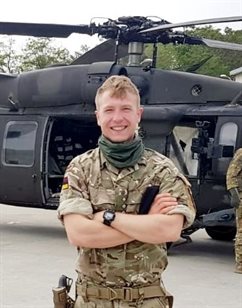This year marks 21 years of the Graduate Entry Medicine programme at St George’s, University of London. To mark this milestone, we will be sharing reflections from staff, students and alumni of the course throughout the year, culminating in an on-site celebration at St George’s. In this story, we hear from Graduate Entry Medicine alumnus Dr John Tweed about how his time at St George’s led to a varied and rewarding career in the military.
 Following a career as a Management Consultant, Dr Tweed joined the Graduate Entry Medicine programme and then the Officer Training Corps whilst studying at St George’s, culminating in a Medical Cadetship with the British Army. After completing the Graduate Entry Medicine course at St George’s, Dr Tweed undertook his Foundation training at Frimley Park Hospital, including four months working in a military GP practice and four months working in military Psychiatry.
Following a career as a Management Consultant, Dr Tweed joined the Graduate Entry Medicine programme and then the Officer Training Corps whilst studying at St George’s, culminating in a Medical Cadetship with the British Army. After completing the Graduate Entry Medicine course at St George’s, Dr Tweed undertook his Foundation training at Frimley Park Hospital, including four months working in a military GP practice and four months working in military Psychiatry.
Following this, he commissioned as a Medical Officer at the Royal Military Academy Sandhurst and then the Post-Graduate Medical Officer course at Defence Medical Services Whittington, where doctors learn how to apply their skills in remote locations. These are prerequisites to working as a General Duties Medical Officer (GDMO), a post which lasts around three years. Whilst it does not count towards formal training as a doctor, it offers a broad range of opportunities both in the UK and abroad.
Throughout his GDMO time Dr Tweed was based in Belgium and belonged to a regiment in Germany. He also deployed to Kenya and then Afghanistan, where he provided care throughout the first Covid-19 outbreak, before returning to the UK in May 2020.
Following his GDMO time, Dr Tweed started Core Psychiatry Training at South London and Maudsley NHS Foundation Trust. He has spent the last five months working in a tertiary centre that provides care to patients from across the UK who suffer from treatment-resistant psychosis. Earlier in the pandemic, he also worked on a Covid Triage admission ward, where newly admitted patients received initial psychiatric triage and treatment whilst awaiting Covid testing.
Speaking about his decision to train as a psychiatrist, Dr Tweed says:
“Becoming a psychiatrist was something I had already considered during the Graduate Entry Medicine programme. The amount of time you get to spend with patients in the role is incomparable. Working with patients is a huge privilege. I’m grateful to be in an industry where the bottom line is providing good care.”
Reflecting on his time at St George's, Dr Tweed says: “When I made the decision to change from Management Consultancy to Medicine, St George’s stood out as a place to study due to its central location and as one of the few four-year medicine programmes available.
“What is more, on starting the programme, I was amazed by the diversity of people on the course, from a trapeze artist and an ex-pilot, to a journalist and a professional artist. It was easy to make friends and get along with people, because it really felt like an environment where everyone could be themselves.”
Speaking about how the programme prepared Dr Tweed for his current career, he adds:
“Knowing how to work with people plays an enormous factor in a career as a doctor, and the course was set up to provide competent and caring physicians. The focus on communication skills, early exposure to clinical settings and other practical aspects of the course set you up well for a medical career.”
Sharing advice with current students exploring career options, Dr Tweed says: “Joining the Officer Training Corps is a great way to explore the military avenue whilst you are still a student. I had no idea what it was all about when I first started, but the military recruits for all sorts of roles and looks for diversity in its applicants. Many people have preconceptions about the Army, but I would recommend giving it a try – you might find out something you didn’t know and discover something that is a good fit for you.”
To submit any questions for John about his career, contact alumni@sgul.ac.uk with the email heading ‘Query - John Tweed – Careers Advice’.